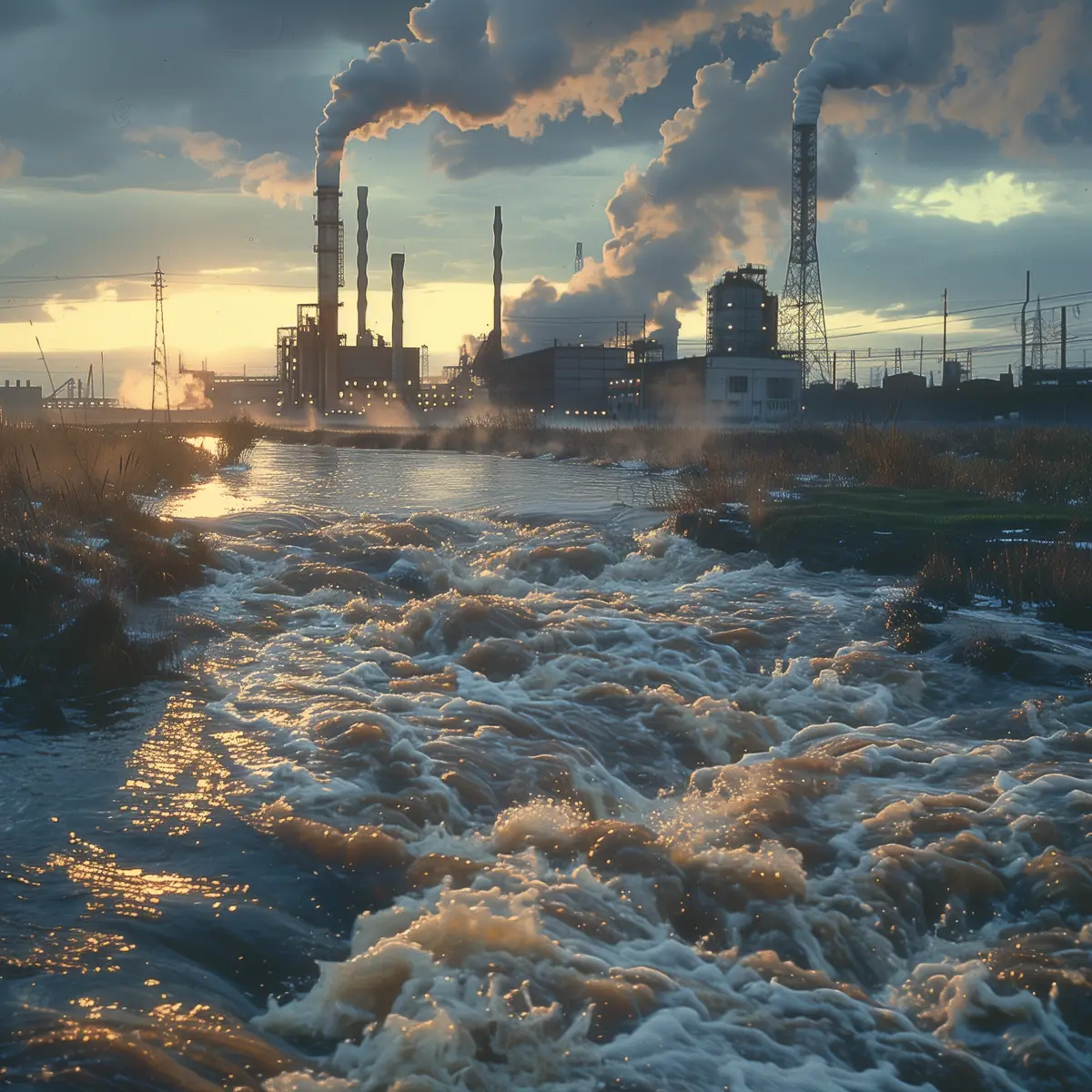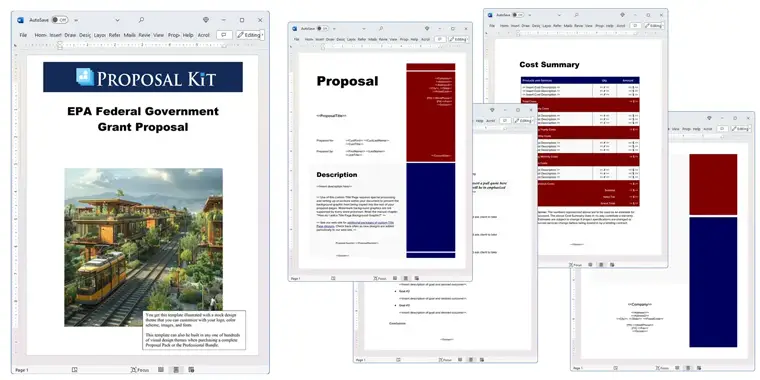How to write your EPA Federal Government Grant Proposal
We include this 22 page layout with every Proposal Pack. If you want this template to have a different visual design theme than the one illustrated here, purchase any Proposal Pack design and create this template using the purchased design theme. This template is included in every Proposal Pack. If you get a Proposal Pack or the Professional Bundle, you can also make any variation of this template with different chapters to suit your needs.
We typically include more chapters in the templates than most people will need to give everyone more variety in the chapters they may need. You can trim down a long template by removing pages you do not need or combining multiple chapter topics into one page.
 DOWNLOADABLE, ONE-TIME COST, NO SUBSCRIPTION FEES
DOWNLOADABLE, ONE-TIME COST, NO SUBSCRIPTION FEES![]() View EPA Federal Government Grant Proposal
View EPA Federal Government Grant Proposal
This sample proposal is based on the same layout as this template and is included in every Proposal Pack. The visual design of the templates will match whichever Proposal Pack design you purchase. To get this template in a different design theme than shown in the sample, purchase any other Proposal Pack design theme and this template will be included.
You can create an editable Word version of this sample in any design theme of your choice including branded to your logo.
 If you need this template on DVD media order from our Amazon shop.
If you need this template on DVD media order from our Amazon shop.
You can also create countless variations of this document to suit your needs using the included library of 2200+ chapters if ordering a Proposal Pack or Pro Bundle.
 What Our Clients Say
What Our Clients SayProposal Pack has great examples and will help you develop professional proposals. No need to start from scratch, this tool leverages tried and true formats and content to help you develop proposals that help you make the short list."
Manager, Engineering
Related Article
Related Video
Related Templates
- EPA Federal Government Grant Proposal #2
- DOJ Federal Government Grant Proposal
- DOJ Federal Government Grant Proposal #2
- DOE Federal Government Grant Proposal
- DOE Federal Government Grant Proposal #2
- HHS Federal Government Grant Proposal
- HHS Federal Government Grant Proposal #2
- USDA Federal Government Grant Proposal
- DOH Federal Government Grant Proposal
- Environmental Cleanup Proposal
- Natural Resources Management Proposal
- Bioremediation Environmental Services Proposal
- EPA Federal Government Grant Proposal 2
- Biogas Project Proposal
- DOJ Federal Government Grant Proposal 2
- HHS Federal Government Grant Proposal 2
- Environmental Program Proposal
What's the best way to write your EPA federal government grant proposal?
A proven way to create an EPA federal government grant proposal is using the Proposal Kit template and software package. This comprehensive tool simplifies the process for individuals unfamiliar with proposal writing, providing structured templates and a powerful wizard software program that guides you through each step. The Proposal Kit also features a line item quoting database system crucial for creating detailed financial documents such as cost summaries, quotes, estimates, and budgets.
For over twenty years, Proposal Kit has been used to create responses to government RFPs. It includes a library of templates, examples of actual EPA RFP responses, and a separate manual on developing responses to government grants using the Proposal Kit.
What Types of Projects Are EPA Federal Government Grants Written For?
EPA federal government grants typically cover various environmental projects for conservation, pollution reduction, and sustainable practices. Here are ten examples of such projects:
- Air Quality Improvement Initiatives: Programs aimed at reducing air pollution in urban areas.
- Water Conservation Measures: Projects to reduce water waste and improve water use efficiency.
- Renewable Energy Installations: Implementation of solar, wind, or other renewable energy sources.
- Wildlife Conservation Efforts: Protection and rehabilitation of endangered species and their habitats.
- Environmental Education Programs: Initiatives to educate the public about environmental conservation and sustainable practices.
- Waste Management Improvements: Development of more efficient recycling and waste management systems.
- Green Infrastructure Projects: Creating sustainable urban environments through green buildings and parks.
- Hazardous Waste Cleanup Programs: Removal or treatment of hazardous wastes from contaminated sites.
- Sustainable Agriculture Development: Support for farming practices that maintain environmental health.
- Community Engagement and Outreach: Projects that involve community participation in environmental protection efforts.
Chapters this template is built with
Each section of your proposal plays a vital role in demonstrating your project's value and compliance with EPA guidelines. This set of topics is an example of a response to an EPA grant. You can select topics that match any RFP's guidelines using the Proposal Kit.
Each of these components is integral to creating a thorough EPA federal government grant proposal response that communicates the significance and feasibility of your environmental project.
These templates are just a few of the extensive resources available in the Proposal Kit library. The library can be customized to cover all necessary topics for your EPA grant proposal.
Cover Letter
The cover letter should introduce your organization and highlight its mission and achievements in environmental conservation. Briefly outline how your project aligns with the Environmental Protection Agency's (EPA) objectives, emphasizing previous collaborations with government bodies or similar projects. This section should be brief yet powerful, setting a solid foundation for the following detailed proposal.
Cover Sheet
The cover sheet is the proposal's front page and should include the project title, your organization's contact details, and a concise funding request summary. This summary should quickly capture the essence of the project and the amount of funding needed, providing a snapshot for the reviewers to reference throughout their assessment. The agency publishing the RFP may supply the cover sheet as a form you will include in the proposal response.
Needs Assessment
In the needs assessment, justify the necessity of your project by presenting data and research highlighting the environmental issues your project addresses. Include relevant statistics, findings from recent studies, and any testimonials from experts that underscore the urgency and relevance of your intervention.
Location Analysis
Please describe the location where the project will be implemented, detailing its environmental conditions and why it is ideal or requires intervention. Discuss any unique ecological, geographical, or community attributes that make the site a priority for the proposed project.
Goals and Objectives
Clearly outline your project's aims, specifying the immediate and long-term objectives. Each objective should be measurable, achievable, relevant, and time-bound (SMART), aligning with the EPA's broader environmental goals.
Benefits
Detail the benefits of the project, both environmental and societal. Explain how the project will improve local ecosystems, enhance public health, and improve community well-being. Include potential economic benefits, such as job creation or increased efficiency in resource use.
Implementation Plan
Provide a comprehensive outline of how you plan to implement the project, including detailed timelines and milestones. Discuss the phases of the project, critical activities scheduled, and the roles and responsibilities of project team members.
Site Planning
Discuss the physical preparations required at the site before project commencement. These might include clearing, building facilities, or installing equipment important for the project's operations.
Planning
Elaborate on the planning process that underpins the project, including risk management, contingency planning, and stakeholder engagement strategies. This section should reassure the EPA of your organization's capacity to manage the project effectively.
Approach
Describe the specific methods and technologies that will be employed in the project. Highlight any innovative practices or tools that will be used and explain why they are the best fit for the project's goals and the site's characteristics.
Project Background
Provide context by discussing similar projects your organization has undertaken or the previous phases of the ongoing project. This history will demonstrate your organization's track record and depth of experience in managing similar initiatives.
Authority
Cite the legal or regulatory frameworks that govern the project. Include any permits, approvals, or collaborations with regulatory agencies that will ensure compliance with federal and state environmental laws.
Evaluation
Detail the criteria and methods you will use to evaluate the project's progress and success. This could include qualitative and quantitative evaluation techniques designed to provide ongoing feedback and enable project adjustments as needed.
Measures of Success
Specify the metrics and indicators that will be used to measure the project's success. These might include specific environmental metrics, community engagement levels, or economic impacts.
Project Budget
Present a detailed budget categorizing all expected expenses, from personnel costs to materials and overheads. Justify the requested funding with precise, itemized estimates demonstrating how the funds will be allocated efficiently.
Constituency
Identify the primary stakeholders and community groups that will benefit from the project. Discuss how these groups have been involved in the project planning and how they will participate in its implementation.
Sustainability
Explain how the project will be sustained after the initial funding period, both environmentally and financially. Discuss any plans for future funding, ongoing community involvement, and measures to ensure the project's activities are sustainable in the long term.
List of Illustrations
Include any diagrams, maps, charts, or other visual aids that help clarify complex information and clearly represent the project plan and its expected impacts.
List of Supporters
List key organizations, community leaders, and other stakeholders who support the project. Include any endorsements or partnerships that add credibility and indicate broad community or sectoral support for the project's goals.
Use cases for this template
Carson's Story: Waste Management
Carson, the founder of EcoWaste Solutions, was driven by a vision to transform waste management in his community with a recycling program designed to minimize landfill use and enhance sustainability. Recognizing his project's potential but needing experience in navigating the complexities of grant applications, Carson turned to Proposal Kit for assistance.
The templates provided a clear framework that allowed him to comprehensively detail his project's approach, integrating advanced recycling technologies with assertive community outreach and education programs. His proposal outlined the environmental impact and community benefits, perfectly aligning with the EPA's sustainability and public engagement goals. The clarity and precision of Carson's proposal, facilitated by the Proposal Kit, were instrumental in securing the grant.
The success of his application not only funded the initiative but also established EcoWaste Solutions as a model for community-driven environmental innovation, inspiring similar efforts in neighboring regions.
Riley's Story: Quick Turnaround for Clean Energy
Riley, a project manager at Sustainable Energy Inc., was under pressure to submit a proposal for a community solar project, with just days to compile a comprehensive document that adhered to strict EPA guidelines. To tackle this challenge, Riley employed Proposal Kit's streamlined templates to organize and expedite the writing process. He used an AI writing tool to enhance further the proposal, which helped refine the technical descriptions and integrate data from Sustainable Energy Inc.'s past projects. This approach saved valuable time and ensured that the proposal resonated with EPA evaluators by showcasing a clear understanding of clean energy benefits and community impact.
The combination of Proposal Kit's structured format and AI-enhanced content allowed Riley to submit a polished and persuasive proposal on time, ultimately securing the critical funding needed to launch the community solar initiative.
Taylor's Story: A Nonprofit's Path to Conservation
As the director of Green Future Nonprofit, Taylor faced the task of managing a large-scale conservation project requiring diverse expertise. To outsource various project components, Taylor needed to create a detailed Request for Proposals (RFP) to attract competent contractors while ensuring alignment with the project's broad environmental goals.
Leveraging the Proposal Kit, Taylor created a comprehensive and clear RFP with its expectations and criteria for contractor selection. The structured templates helped her delineate the project scope, outline specific goals, and set forth evaluation criteria that mirrored the nonprofit's commitment to environmental stewardship.
The detailed RFP facilitated a competitive bidding process, drawing high-quality responses from contractors well-equipped to handle the project's requirements. Taylor's use of the Proposal Kit enabled her to streamline the contractor selection process, ensuring that the conservation project was not only successful in its execution but also effective in achieving its long-term sustainability objectives.
Conclusions and Recommendations
Writing an EPA federal government grant proposal is crucial for securing funding and advancing environmental projects. The Proposal Kit provides an invaluable resource, offering templates and tools that guide you through the process and help you produce a professional and compelling proposal. A well-written EPA federal government grant proposal using the Proposal Kit simplifies the writing process. It enhances your chances of success, making it an important tool for anyone seeking EPA funding.
Also Known As
This template may also be referred to in different ways or be used in more specialized situations, such as:
- EPA Environmental Grant
- Federal Environmental Protection Agency Grant
- EPA Funding Opportunity
- EPA Environmental Assistance Program
- Federal Environmental Support Grant
- EPA Project Funding
- Environmental Protection Agency Grant Award
- EPA Government Grant
- EPA Environmental Initiative Funding
- Federal EPA Project Grant
Abstract
 Creating a successful proposal for an Environmental Protection Agency (EPA) federal grant requires thorough preparation and use of resources like the Proposal Kit software package. This tool offers a structured approach with templates that simplify proposal writing, even for those new to the process. With its comprehensive library, Proposal Kit guides users through creating detailed documents important for responding to government requests for proposals (RFPs). Such proposals often support projects like air quality improvement, water conservation, and renewable energy installations, aligning with the EPA's mission to protect the environment and promote sustainable practices.
Creating a successful proposal for an Environmental Protection Agency (EPA) federal grant requires thorough preparation and use of resources like the Proposal Kit software package. This tool offers a structured approach with templates that simplify proposal writing, even for those new to the process. With its comprehensive library, Proposal Kit guides users through creating detailed documents important for responding to government requests for proposals (RFPs). Such proposals often support projects like air quality improvement, water conservation, and renewable energy installations, aligning with the EPA's mission to protect the environment and promote sustainable practices.
An EPA grant proposal typically starts with a strong introduction of the organization and its alignment with the EPA's goals, laying the foundation for the proposal. It should include a needs assessment based on data and research, a location analysis, and clear goals and objectives that are measurable and align with federal guidelines.
It's crucial to detail the project's benefits in terms of environmental and societal impact, followed by a robust implementation plan. This plan should outline the project's phases, timelines, and the roles of team members, ensuring clarity and accountability.
 A detailed project budget is another key component, requiring precise estimates to justify funding needs. The proposal must also show how the project will sustain itself long-term, both financially and environmentally. Using Proposal Kit, individuals can organize these components, increasing the chances of securing federal grants through meticulous planning and execution. This robust approach ensures that the proposal not only meets but exceeds the EPA's criteria, paving the way for impactful environmental initiatives.
A detailed project budget is another key component, requiring precise estimates to justify funding needs. The proposal must also show how the project will sustain itself long-term, both financially and environmentally. Using Proposal Kit, individuals can organize these components, increasing the chances of securing federal grants through meticulous planning and execution. This robust approach ensures that the proposal not only meets but exceeds the EPA's criteria, paving the way for impactful environmental initiatives.
In addition to offering a structured approach, the Proposal Kit assists applicants in aligning their submissions with the specific expectations of the United States Environmental Protection Agency (EPA). This alignment is crucial for proposals seeking federal grants under the agency's diverse funding opportunities. Whether targeting federal environmental support grants or EPA environmental assistance programs, the Proposal Kit ensures that each proposal addresses the agency's stringent requirements.
The Proposal Kit's software not only helps in writing proposals but also provides tools to create precise cost summaries, quotes, and estimates, which are critical for the project's budget section. This precision is especially important for projects under the EPA's environmental initiative funding, which often demands detailed financial documentation to ensure efficient use of resources.
 When applying for EPA project funding, applicants must navigate the complexities of the submission portals. The Proposal Kit includes guidelines to avoid common submission pitfalls, such as missing deadlines or incorrect formatting, which are frequent challenges in the grant application process.
When applying for EPA project funding, applicants must navigate the complexities of the submission portals. The Proposal Kit includes guidelines to avoid common submission pitfalls, such as missing deadlines or incorrect formatting, which are frequent challenges in the grant application process.
By incorporating advanced technologies and innovative methods into the project approach, proposals can further enhance their appeal to the Environmental Protection Agency. For instance, integrating cutting-edge renewable energy systems or advanced waste management techniques can demonstrate the proposal's contribution to the agency's overarching mission of environmental preservation.
Lastly, the Proposal Kit aids in illustrating the project's potential impact through visual supports like diagrams and maps by allowing all Word features to be used. These aids can vividly represent the project plan and expected outcomes, providing reviewers with a clearer understanding of the project's significance. By using these resources, applicants can present a case for their projects, securing the necessary funding to drive forward important environmental initiatives under the flag of environmental stewardship.
Frequently Asked Questions
What are the eligibility requirements for an EPA Federal Government Grant?
Eligibility requirements for an EPA Federal Government Grant vary depending on the specific grant program. Generally, eligible applicants may include state and local governments, tribal governments, non-profit organizations, educational institutions, and, in some cases, private businesses. Always refer to the specific grant announcement for detailed eligibility criteria.
How can I ensure my project proposal meets EPA's evaluation criteria?
Review the grant announcement and rubric provided to ensure your project proposal meets EPA's evaluation criteria. Address each criterion explicitly in your proposal, providing precise and detailed information on how your project meets these requirements. Highlight your project's environmental impact, feasibility, sustainability, and innovation.
What documentation and supporting materials should be included with my proposal?
Commonly required documentation and supporting materials include a detailed project narrative, budget justification, resumes of key personnel, letters of support or commitment from partners, and evidence of past performance on similar projects. Ensure all documents are well-organized, clearly labeled, and meet the formatting guidelines specified in the grant announcement.
How do I accurately estimate the project budget for the grant proposal?
To accurately estimate the project budget, conduct thorough research and obtain quotes for all necessary expenses, including personnel, equipment, supplies, travel, and indirect costs. Break down the budget into detailed line items, justify each cost, and ensure that your budget aligns with the project's scope and objectives. Consider potential contingencies and include any required matching funds.
What is the process for submitting the EPA grant proposal, and what are the common submission pitfalls?
The submission process for EPA grant proposals typically involves completing and submitting your application through Grants.gov or another specified online portal. Common submission pitfalls include missing the submission deadline, failing to follow formatting and file naming conventions, not providing all required documents, and not registering with Grants.gov in advance. To avoid these pitfalls, carefully follow the submission instructions, allow ample time for preparation and submission, and double-check that all required components are included and correctly formatted.
15% Off Discount
![]() Add To Cart This Word Template Only
Add To Cart This Word Template Only
 Add To Cart Proposal Pack for Government Grants
Add To Cart Proposal Pack for Government Grants
 Add To Cart Proposal Kit Professional Bundle
Add To Cart Proposal Kit Professional Bundle
 4.7 stars, based on 846 reviews
4.7 stars, based on 846 reviewsProposal Kit chapters used in this template
Cover Letter, Cover Sheet, Title Page, Table of Contents, Needs Assessment, Location Analysis, Goals and Objectives, Benefits, Implementation Plan, Site Planning, Planning, Approach, Project Background, Authority, Evaluation, Measures of Success, Project Budget, Constituency, Sustainability, List of Illustrations, List of Supporters, Back Page
Included Calculator Spreadheets
These Excel calculator spreadsheets are included with this template. If you purchase a Proposal Pack or the Professional Bundle, these proposal pages are generated using an automated line-item database in the included Wizard software. The calculator spreadsheets are intended for use when purchasing only the static Word template.
You use this proposal for
- Non-technical proposal
- Service sales proposal
- Project pitch proposal
- RFP response
- Federal government grant proposal
- Nature, environmental proposal
How to create this template with Proposal Pack Wizard
You can create this document using any of the logo-designed Proposal Packs. Pick any Proposal Pack with a logo design theme you like best; they will all work equally well. The Proposal Pack for Any Business is the pack with no extra added logos or colors - designed to be used plain or for you to customize with your logos and graphics.
The Proposal Pack design theme you purchase will determine the visual look of this template. The screenshot above only shows the plain generic design theme. Names and stories in examples are fictional; however, the templates are from real client use cases.
We include a library of chapters to be assembled based on your needs. All proposals are different and have different needs and goals. We designed Proposal Pack so you can customize the documents to suit your needs.
You will best create this document using the Proposal Pack Wizard - Expert Edition software to select this template and build it in the Proposal Pack logo design theme of your choice along with any desired customizations (such as adding additional chapters, removing unneeded chapters, changing the order of chapters, and importing your company logo). This template outlines a proposal for the described situation. Each user is responsible for typing in the actual content of the provided pages with their information to complete the proposal. Suggestions in the abstract may include features in higher-end packages and are facilitated by the selection of chapter templates to support the narrative of each proposal, which help guide the user in filling in the details.
You create this template using the Wizard software with an entire Proposal Pack library and software. We include the Expert Edition of the software in the Proposal Kit Professional bundle. Microsoft Word for Windows is required to use the customizing software. You can also edit Word document templates in other office software such as Word for Mac. We will assist Mac users in assembling complex templates for their first project if they do not have the required platform to run the Wizard software.
You only get the single assembled Word document if purchased as a stand-alone template. The individual template products include no other templates, samples, or software.
How to Build Templates Featured on Proposal Kit Website
Many people find the Proposal Kit website after searching for a specific proposal. Once you've purchased and installed the software, how do you build that template you found in the first place? This video shows you how to build any proposal you see on the Proposal Kit website.
Key Takeaways
- The EPA Federal Government Grant Proposal is available as a ready-to-edit template.
- You can create unlimited custom variations of this template using a Proposal Pack or the Professional Bundle.
- Using a Proposal Pack or Professional Bundle, you can automate quotes and other financial pages with a line-item database.
- There are no ongoing subscription fees. You get lifetime unlimited use.
- We made Proposal Kit for freelancers, small businesses, and non-profits.
- Proposal Kit product content (templates, samples, software) is 100% written by humans.
 Ian Lauder has been helping businesses write their proposals and contracts for two decades. Ian is the owner and founder of Proposal Kit, one of the original sources of business proposal and contract software products started in 1997.
Ian Lauder has been helping businesses write their proposals and contracts for two decades. Ian is the owner and founder of Proposal Kit, one of the original sources of business proposal and contract software products started in 1997.By Ian Lauder
 Published by Proposal Kit, Inc.
Published by Proposal Kit, Inc.


 Cart
Cart


 Get 15% off ordering today:
Get 15% off ordering today: 

 Facebook
Facebook YouTube
YouTube X
X Search Site
Search Site